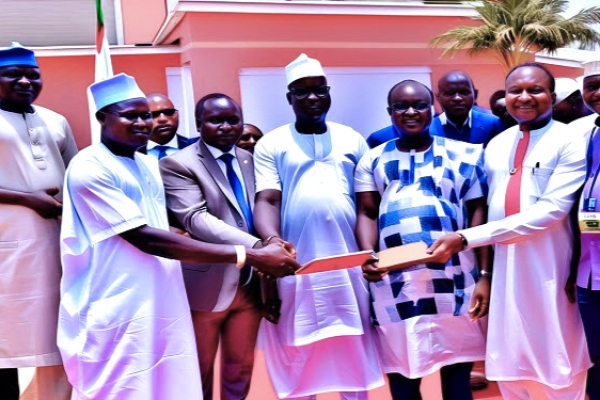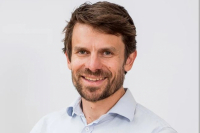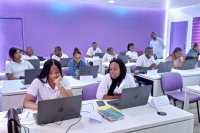Zimbabwe, in partnership with the Food and Agriculture Organization (FAO), is establishing digital hubs in Bikita and Mhondoro-Ngezi districts under the Fostering Digital Villages Through Innovative Advisory and Profitable Market Services in Africa (FDiVi) project.
The hubs will serve over 5,000 residents, offering affordable internet access, digital skills training, and tools to improve efficiency across the agricultural value chain.
The initiative will empower smallholder farmers, agro-dealers, processors, and extension officers, particularly women and youth, to participate in the digital economy. It is expected to close the digital divide, enhance rural livelihoods, and foster a more inclusive agricultural sector in Zimbabwe.
The Gambian government aims to accelerate the country’s digital transformation. In May 2024, the executive already established a partnership with the Emirati technology company Presight.
The Gambian Ministry of Communications and Digital Economy has partnered with the Kalp Foundation, a nonprofit organization dedicated to developing blockchain-based digital public infrastructure (DPI). This collaboration will lead to the creation of a decentralized platform called “Gambia One,” designed to secure data exchanges, streamline government operations, and digitize critical services.
“Together, we will harness the power of blockchain-enabled DPI to deliver innovative, citizen-centric solutions that align with global standards of trust, transparency, and accountability,” said Lamin Jabbi, Gambian Minister of Communications and Digital Economy. The partnership also includes capacity-building initiatives for government leaders and training programs focused on blockchain ecosystems and related technologies for young Gambians.
This initiative aligns with the Gambian government’s ambition to “leverage technology, digital solutions, and services to ensure digital inclusion by connecting the unconnected and under-connected, create jobs, and develop the economy.” It builds on earlier efforts, including a partnership established with the Emirati tech company Presight in May 2024. Additionally, in 2023, Gambia joined the Smart Africa Alliance, which promotes the use of ICT to accelerate economic and social development across Africa.
Currently, Gambia ranks 164th out of 193 countries in the 2024 E-Government Development Index measured by the United Nations Department of Economic and Social Affairs (UNDESA). The country scored 0.2552 out of 1, significantly below the averages for West Africa (0.3957), Africa (0.4247), and the global average (0.6382).
The timeline for launching the Gambia One platform remains unknown, as do the precise details of the agreement between the parties involved. However, the success of the initiative will depend on the population’s access to the internet and compatible devices. According to DataReportal, Gambia had 1.5 million internet users at the start of 2024, representing an internet penetration rate of 54.2%.
By Isaac K. Kassouwi,
Editing by Sèna D. B. de Sodji
Driven by a passion for entrepreneurship, she's on a mission to revolutionize childcare services in Tunisia. Her dedication and hard work have garnered numerous awards and accolades.
Nivine Moussa (photo) is a Tunisian marketing expert and entrepreneur. As the founder and CEO of Bambinosit, she aims to revolutionize childcare services in Tunisia.
Bambinosit is a digital platform that connects parents with qualified babysitters and social and school support workers. Through this platform, parents can easily find profiles that align with their expectations, both in terms of skills and personal values.
Beyond assisting parents, Bambinosit also provides young students and unemployed individuals with income opportunities. The platform offers practical tools such as availability calendars, geolocation services, and detailed nanny profiles that highlight their skills and experience. Parents can even arrange interviews and babysitting trials directly through the platform.
A graduate of the Higher Institute of Business Studies in Carthage, Tunisia, Nivine Moussa earned a bachelor's degree in marketing in 2019 and a research degree in marketing in 2021. She began her professional journey in 2018 as a telemarketing operator at MFR Consulting, a health insurance firm. After an internship in 2019 at Medianet, an agency specializing in e-business and digital strategy, she worked as a French teacher.
In 2021, Moussa received the award for Best Student Entrepreneur in Tunisia. The following year, she was named Tunisia’s Best Entrepreneur. In 2024, she was recognized as a laureate of the Lab’Innova Italian program by the Italian Trade Agency.
Melchior Koba
Network International (Network), an enabler of digital commerce in the Middle East and Africa, has partnered with Money Fellows, the top money circles app, to introduce its first payment solution in Egypt. The partnership was announced on January 8.
Network will provide its ‘Digital Payments as a Service’ platform, offering secure payment functionality, advanced fraud prevention, and managed back-office services. The integration aims to enhance the app’s user experience and versatility.
With its regional expertise, Network will support Money Fellows' expansion across the Middle East and Africa, helping modernize money circles and expand financial access.
Podcasts have exploded in popularity worldwide in recent years. Two tech entrepreneurs are launching a platform that offers audio content specifically tailored for African audiences.
Genti Media is a Nigerian platform dedicated to promoting African stories. It offers tales, dramas, and educational materials narrated in African languages by African voices. Founded in 2021 by Ojiugo Uche and Ekemezie Uche, the Lagos-based startup aims to preserve and elevate the continent’s rich storytelling traditions.
The mobile application, available on iOS and Android, has already been downloaded over 10,000 times on the Play Store. Users can create an account using their email, Google, or Facebook credentials to access Genti Media's catalog. The platform boasts over 15,000 hours of African audio stories, educational content, radio plays, and sermons, all available in more than 20 African languages.
An "Explore Now" button allows users to try the platform without creating an account. However, account creation becomes mandatory for continued listening. Genti Media offers a tiered access model, with some titles available for free and others requiring users to watch ads or purchase a coin bundle to unlock.
“Several titles are free on the app. Also, trailers and one or two episodes of paid content are free so you can check a title out. Once you have confirmed you like the content and want to listen to more, you can unlock content either by watching ads (no payment necessary) or unlock by buying a coin bundle. You have multiple options,” explains the startup.
Genti Media compensates its creators, a policy that has attracted numerous Nigerian storytellers, particularly those speaking the country’s major languages, such as Igbo, Hausa, and Yoruba.
Adoni Conrad Quenum
Cybercrime has a broader ripple effect, increasing business costs and deterring foreign investment. Strengthening technical and organizational capacity will be crucial to maintaining investor confidence and accelerating economic diversification.
The Nigeria Police Force National Cybercrime Centre (NPF-NCCC) has achieved remarkable milestones in 2024, including the recovery of ₦8,821,001,881.80, 115,237.91 USDT, and $84,000, a press release dated January 7 revealed. These funds, reclaimed from cybercriminal activities, have been returned to victims, reflecting the unit's commitment to justice and protecting citizens from digital fraud.
ACP Olumuyiwa Adejobi, the Force Public Relations Officer, reiterated the NPF's commitment to staying ahead of cybercriminals and enhancing Nigeria's cybersecurity framework to ensure a safer digital environment for all.
In the past year, the NPF-NCCC arrested over 751 cybercrime suspects and confiscated 685 devices used in illegal activities, including 467 mobile phones, 137 laptops, 46 routers, and four Starlink devices. Additional recoveries include 16 houses, 39 plots of land, 14 land documents, and 26 vehicles, the release revealed.
For its exceptional performance, the unit was named Africa's Best Cybercrime Unit for 2024 by INTERPOL's Cybercrime Directorate, outperforming units from 54 African nations. This prestigious accolade underscores the NPF-NCCC's dedication to combating cyber threats and enhancing digital security.
The Nigeria Police Force remains resolute in safeguarding the digital space and urges citizens to practice cyber vigilance. Sharing sensitive information cautiously and fostering a culture of online responsibility are critical steps to reducing cyber threats.
Nigeria has been ranked as a Tier 3 "Establishing" country (score: 55–85) in the 2024 Global Cybersecurity Index (GCI) by the International Telecommunication Union (ITU). The GCI assesses countries on five pillars: legal measures, technical capabilities, organizational capacity, capacity building, and cooperation. The country scored 19.52 out of 20 in legal measures, reflecting the strength of its Cybercrimes (Prohibition, Prevention, etc.) Act of 2015, which supports prosecuting cybercriminals and securing digital transactions.
However, the Tier 3 ranking highlights gaps in technical capabilities, organizational capacity, and cooperation, revealing vulnerabilities in cybersecurity infrastructure. Limited resources for detecting and responding to threats leave critical sectors, such as banking and telecommunications, exposed to sophisticated attacks like ransomware. Broader enforcement and improved infrastructure are needed to strengthen the country’s defenses.
The recognition of the NPF-NCCC as Africa's Best Cybercrime Unit by INTERPOL is a testament to Nigeria’s capacity to tackle complex digital crimes. Historically, the country has faced criticism over weak law enforcement against cybercrime. This achievement marks a turning point, reinforcing global confidence in Nigeria’s commitment to cybersecurity.
Hikmatu Bilali
A trained accountant and industrial engineer, he is passionate about artificial intelligence (AI) and leverages this technology to help businesses streamline their operations.
Stephen de Goede (photo) is a South African entrepreneur with a background in technology. In 2023, he co-founded Qudu in 2023, a startup dedicated to democratizing access to generative artificial intelligence (GenAI) technologies across Africa. The company aims to provide businesses with significant competitive advantages through innovative and tailored solutions.
Qudu specializes in consulting and deploying GenAI technologies, helping businesses automate operational tasks so their teams can focus on more strategic initiatives. Its offerings include intelligent chatbots and custom AI solutions designed to meet the unique needs of each organization.
The company also provides customized training programs for teams, focusing on the practical application of AI. These programs are designed to equip employees with the skills needed to integrate AI into their daily workflows. With a methodical and incremental approach, Qudu supports its clients in implementing tailored AI solutions that address complex business challenges while maximizing efficiency.
Stephen de Goede graduated from Stellenbosch University, earning a bachelor’s degree in accounting in 2013 and another in industrial engineering in 2015. In 2020, he worked as an auditor at the American accounting firm Berdon LLP. He later joined Root, a software development company, where he served as a solutions engineer until 2023.
Melchior Koba
The streaming market is dominated by American giants like Netflix, HBO, and Amazon Prime Video. In Senegal, Modou Lolly Sarr wants to create a solution of similar scale.
Wawaw is a digital platform offering streaming access to African cinematic content. Founded in Dakar in 2024 by Modou Lolly Sarr, the startup received a grant of XOF 7 million (approximately $11,000 USD) from Senegal's General Delegation for Women and Youth Entrepreneurship to support its growth.
“Becoming the leading streaming platform for African films, showcasing the best of African cinema, and enabling African filmmakers to share their stories with the world” is the startup's ambitious goal.
While Wawaw has yet to launch a mobile application, users can access its catalog of films by creating an account directly on the web platform. The library currently features a mix of Hollywood blockbusters and Senegalese and African productions. In 2024, the company actively pursued partnerships with African producers to better promote their work.
Beyond streaming, Wawaw aims to expand into film project booking and management and the modernization of production processes. To support this, the company plans to train 500 young cinema enthusiasts in collaboration with the Yennenga Center, teaching them the basics of production and how to use modern tools.
The startup also plans to invest in new equipment and eventually produce its own films, following in the footsteps of major platforms like Netflix, Crunchyroll, and AppleTV. For 2025, Wawaw intends to roll out an Android mobile app and enhance its web platform to improve user experience.
Adoni Conrad Quenum
He aims to help businesses boost their performance by providing customized WhatsApp solutions that enhance customer engagement.
Jonathan Elcock (photo) is a South African tech entrepreneur and the CEO/Cco-founder of rather.chat, a startup specializing in developing AI-powered chatbots.
Founded in 2017, rather.chat creates chatbots designed to help businesses of all sizes and sectors market their products, close sales, and interact with customers via WhatsApp. These chatbots can conduct conversations with potential clients while gathering essential information for the brands they represent.
The company aims to revolutionize how businesses communicate with their customers by strengthening relationships and expanding reach. To date, the rather.chat platform has facilitated interactions with over 15 million South Africans through its chatbots.
“Scaling sales and service is tough. I’ve lived through the headaches of trying to meet customer expectations using call centers, SMS and email automations. I eventually reached the conclusion ‘there had to be a better way’, that’s why I started rather.chat,” explains Jonathan.
The tech entrepreneur graduated from the University of Cape Town in 2009 with a bachelor’s degree in actuarial science. His career began in 2010 at Zestlife, a financial services provider, where he worked in product development. In 2013, he moved to the company’s call center operations department. From 2014 to 2017, he served as Head of Sales and Commerce at MiWayLife, a South African insurance company.
Melchior Koba
In today's rapidly evolving digital landscape, African countries are modernizing their education systems. Integrating digital technologies is crucial for addressing current educational challenges and creating a more inclusive and accessible learning environment.
Gabon’s Council of Ministers on Sunday approved a draft ordinance aimed at digitizing the country’s education system.
The ordinance seeks to integrate digital technologies and educational platforms into teaching and learning methods, according to a government statement.
"The draft ordinance aims to strengthen the legal and regulatory framework governing the transformation of teaching and learning methods through the integration of digital technologies and educational platforms," the statement said. "This reform is all the more urgent as the COVID-19 health crisis highlighted the need to develop alternatives to in-person teaching."
This decision aligns with the government's ongoing efforts to modernize the education system. In December, the government launched an inter-ministerial partnership to connect schools to the internet.
The anticipated outcomes of the digitization initiative include greater resilience in the education system during crises, reduced inequalities between urban and rural areas, and the modernization of teaching practices. The reform is also expected to help train a skilled workforce to support the country's economic transformation.
Samira Njoya
More...
The Congolese government is banking on international cooperation to accelerate its digital transformation. In November 2024, a memorandum of understanding was already signed with Poland to develop digital infrastructure.
The Democratic Republic of Congo (DRC) and Qatar are exploring ways to strengthen bilateral cooperation in the information and communication technology (ICT) sector, among others. The issue was discussed during a meeting between Congolese President Félix Tshisekedi (photo, left) and Qatar's Emir, Sheikh Tamim bin Hamad Al Thani (photo, right), on Sunday, January 5, during an official visit to the Middle Eastern nation.
This rapprochement comes as the Congolese government intensifies its efforts under its vision of making "Congolese digital technology a lever for integration, good governance, economic growth, and social progress." In 2024, the country ranked 41st out of 47 African nations in ICT development, according to the International Telecommunication Union (ITU), with a score of 31 out of 100. Furthermore, official sources report that internet penetration in the DRC is at 30%, compared to about 50% for mobile telephony.
The United Nations Department of Economic and Social Affairs (UN DESA) ranked the DRC 175th out of 193 countries globally in e-government development in 2024, with a score of 0.2715 out of 1. This places the country below the regional averages for Central Africa (0.3354), Africa (0.4247), and the global average (0.6382).
Regarding cybersecurity, the ITU places the DRC in Tier 3, a category for countries that "demonstrate a basic commitment to cybersecurity through government-led actions, including assessment, establishment, or implementation of some generally accepted cybersecurity measures." The country faces significant challenges in areas such as technical measures, capacity building, and cooperation.
In contrast, Qatar boasts an ICT development score of 97.8 out of 100 and an e-government development score of 0.8244. The ITU also considers Qatar a global model in cybersecurity.
Strengthening collaboration with Qatar could provide the Congolese government with the support needed to develop its ICT sector and accelerate its digital transformation ambitions. However, the specific details of this partnership, including areas of intervention and implementation timelines, have yet to be defined. Moreover, no formal agreement has been signed or officially announced between the two parties at this time.
By Isaac K. Kassouwi
Editing by Sèna D. B. de Sodji
In recent years, several African social networks, including Ushahidi, Blueworld, and Eskimi, have emerged with varying degrees of success. In Togo, Bienvenu Fanagnon has developed a social network designed to highlight the continent's talent and rich cultural heritage.
Afrolook is a social network developed by a Togolese startup based in Lomé. It allows users to capture unique moments through photos and videos and communicate via messages. Launched in 2024 by Bienvenu Fanagnon, the platform aims to bring African culture to the forefront.
“Afrolook is an African social network developed by a group of students, built on AI models called XILO and inspired by African culture. [...] We aim to create an engaging and authentic experience to promote African culture on a global scale,” explains Fanagnon.
Currently available only on Android, Afrolook has already been downloaded over 100 times, according to Play Store data. Users must create an account to access its features. One notable tool is the conversational agent XILO, which engages users in discussions on various topics for entertainment. However, it’s worth noting that the platform is still in its testing phase.
The network integrates many familiar concepts from platforms like Facebook and Instagram. Users can post diverse content—photos, videos, or text—to express their creativity and share ideas on various topics. They can also discover inspiring content created by African users worldwide or follow others to stay updated on their shared posts.
Afrolook also fosters community interaction by enabling users to like, comment on, or share posts. Additionally, the startup has introduced a monetization program to reward the platform’s most impactful content creators.
Adoni Conrad Quenum
As an entrepreneur, he blends technological expertise with innovative vision to develop solutions for African needs. He provides digital marketing services to help businesses thrive.
Koami Rummenigge Aziabou is a Togolese-born IT specialist and serial entrepreneur. He is the co-founder of Trenderz, a digital startup based in Abidjan, Côte d’Ivoire, that helps businesses and brands effectively promote their products.
Founded in 2023 by Aziabou and Kim Tran, Trenderz operates a platform connecting African businesses with qualified influencers. Boasting a network of over 1,000 active influencers on platforms like Instagram and TikTok, the app enables companies to expand their reach and boost growth by leveraging the power of influence.
Trenderz is designed to help local businesses attract new customers, deepen engagement, and foster loyalty. The platform also supports organizing events such as product launches, store openings, and contests, where influencers can generate buzz and elevate brand visibility.
In addition to his role at Trenderz, Aziabou is also the co-founder of Kidolé, another 2023 startup. Kidolé offers an online platform for finding, booking, and managing advertising spaces across Africa. It simplifies performance data collection, allowing advertisers to optimize their campaigns. Primary users include advertisers, ad agencies, and media operators.
Koami Rummenigge Aziabou’s career began in 2017 as a developer and project manager at Jet-Solutions, a Togolese IT firm. Between 2019 and 2021, he served as a development lead at MAONO, a strategy and IT solutions consultancy. He later became the technical director of BrandOpera Group, specializing in brand development, and worked as a backend developer for Send Freight, a digital freight forwarder and customs broker for the African market, in 2022.
Aziabou earned a professional bachelor’s degree in Information Technology in 2022 from the University of Lomé. He is currently studying artificial intelligence at the Dakar Institute of Technology in Senegal.
By Melchior Koba,
Editing by Sèna D. B. de Sodji
As a current student in digital engineering, he leverages his skills to impact education and employment. His startup, LaBoussole, has garnered numerous awards and distinctions.
Wilfried Mbeyo’o Nna (photo) is a Cameroonian tech entrepreneur and the founder of LABOUSSOLE, a startup specializing in educational technologies. What began as a development project in June 2022 evolved into a fully-fledged startup by January 2024. LABOUSSOLE offers an intelligent web application designed to guide students and learners in their academic and professional orientation.
The platform helps users achieve socio-professional integration, whether by securing decent employment, becoming self-employed, or venturing into entrepreneurship. Beyond these core services, LABOUSSOLE also provides online training focused on digital careers.
The startup's primary mission is to help users find their path and thrive in their chosen careers. According to its website, the vision is to “create a world where access to information and education is open to everyone, regardless of gender, social background, or level of qualification, enabling all individuals to find their path and flourish in their careers.”
Currently in his final year of digital engineering studies at the International School of Digital Engineering at the Congo-Cameroon Inter-State University in Sangmélima, Cameroon, Mbeyo’o Nna balances his academic pursuits with freelance work in digital marketing and communication. Between 2021 and 2023, he served as the Marketing and Communications Manager for the Cooperative Society of Young Farmers of Dja and Lobo in Cameroon.
In 2024, his entrepreneurial talent earned widespread recognition when LABOUSSOLE won the first prize in the “Social and Human Sciences” category at the GETEC (Génie et Talent de l’Étudiant Camerounais) startup competition, organized by Cameroon’s Ministry of Higher Education.
By Melchior Koba,
Editing by Sèna D. B. de Sodji















